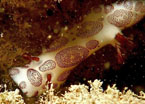| Home |
| Acknowledgments |
| Conventions |
| Glossary |
| Maps |
| References |
| Links |
| Articles |
| Thumbnails |
| Species
list |
| Family |
| Next
species |
Additional Photos

side

light

rhinophores

papillae

maroon

young

large

feeding

with egg mass
_______________
GALLERY

Jorunna funebris (Kelaart, 1858)

| Maximum size: about 70 mm. Identification: This is a distinctive, cream dorid in which the notum is decorated with patches of slightly elevated papillae. The rhinophores, gills and/or papillae range from black to maroon. Natural history: The first Hawaiian animals found were on a sponge substrate near mangroves at about 0.3 m (about 1 ft) and in silty habitats under a pier. (Erik Verhoef, pers. com.) However, later animals were also found in moderately exposed locations. (David Rolla, pers. com.) (Note 1) Rachel Winn also recorded it from 18 m (60 ft). It lays a white, ruffled egg mass and feeds on a slate-blue sponge (Haliclona sp.). Distribution: Big Island, Maui, Molokai, Oahu and Kauai: widely distributed in the Indo-Pacific. Taxonomic notes: It was first recorded in Hawaii from the mouth of Pearl Harbor by Spencer Verhoef on April 10, 2014. Photo: David Rolla: Kakaako, Oahu; Sept. 4, 2016. Observations and comments: Note 1: Although first noticed in early 2014, it has since become fairly common at Pearl Harbor and Point Panic (Erik Verhoef & David Rolla, pers. com.). Whether the species is a recent introduction or a local population having a few good years is unknown. David Rolla found a young animal at Haleiwa in fall, 2018. Meanwhile, Jeremy Bricco and Hai Van On photographed animals at Kawaihae (on the Big Island) in 2019. They've also been photographed several times on Maui during 2019, (first, by Alan E. on March 1). Also, Janice Portillo included a photo taken on Sept 29, 2016 at Lihue, Kauai in a Facebook posting. So, if they are introduced, they appear to be spreading. |
| Thumbnails |
Species
list |
Family | Next species | Top |